Share this
What Is a Rugged Mini PC?
by Brett Daniel on Apr 24, 2020 3:03:41 PM
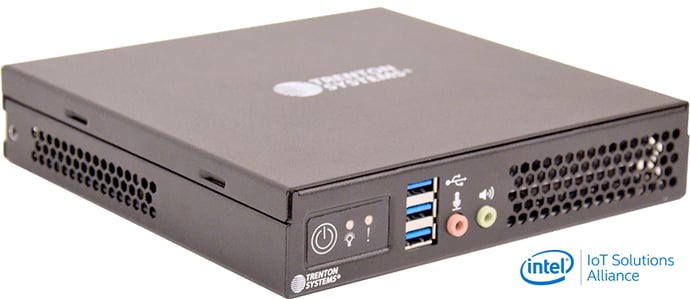
Photo: Rugged mini PCs are durable, reliable, small-form-factor computers. This rugged, high-powered, small-form-factor PC is the perfect solution to the ever-increasing needs of your resource-intensive applications, especially if they're operating in space-limited environments.
NOTE: Thinking about incorporating a rugged mini PC into your program or application? If so, also check out "5 Things to Consider When Choosing a Rugged Mini PC" and "Rugged Mini PC vs. Rugged Laptop: Which Is Right for You?" to learn more about your options.
Rugged mini PCs have exploded in popularity in recent years due to their affordability, durability, size, and simplicity.
Included among this ruggedized assortment of small computers are powerhouse workstations like the Trenton Systems ION Rugged Mini PC, released to the world in early 2020.
These small, ruggedized computers are ideal for resource-intensive military, industrial, and commercial applications, or environments in which conditions are extreme, weight is a concern, or space is limited, such as on a submarine, on a plane, or in a crowded desert outpost.
You're probably wondering how these small-form-factor PCs can benefit your program or application.
Well, here’s the quick and dirty: rugged mini PCs are high-powered, affordable, stress-tested, and compact.
And that’s just what some programs and applications need in a rugged computer.
Video: An overview of Trenton Systems' ION Rugged Mini PC.
What is a rugged mini PC?
A rugged mini PC is a small, durable, lightweight, personal computer that has undergone stress testing or ruggedization for usage in extreme conditions and environments.
They weigh significantly less than a full-sized rugged server or workstation and take up a lot less space, making them ideal for nooks, crannies, or other areas where leftover space could be utilized.
Rugged mini PCs typically power military, commercial, and industrial applications, which often require the increased processing power, durability, reliability, and longevity that a rugged mini PC offers.
Rugged mini PCs can function in all sorts of extreme conditions, including in areas where temperatures are severe or damage caused by vibrations and mechanical shock are a concern.
In short, rugged mini PCs are durable, powerful, yet unimposing. As a small-form-factor PC, rugged mini PCs get the job done while staying out of the way.
At the consumer level, mini PCs are usually reserved for tasks that don’t require a ton of processing power, such as web browsing, emailing, and word or spreadsheet processing.
But in the rugged computing industry, a high-performance, heavy-duty, rugged mini PC allows programs or application to handle, and endure, a lot more. The Trenton Systems ION Rugged Mini PC is just one example of such a computer.
And as with any rugged computer on the market, some rugged mini PCs are bulkier, wider, more powerful, and contain more storage capacity than others.
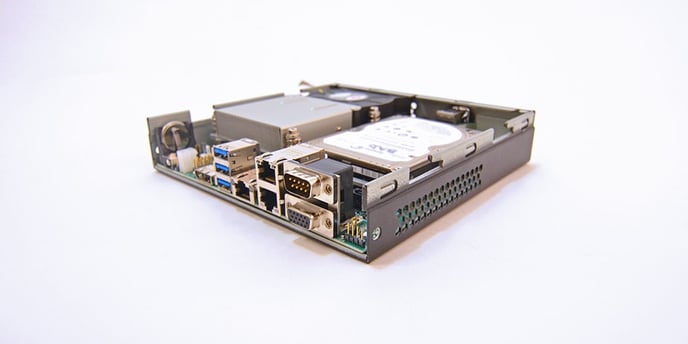
Photo: A rear view of a rugged mini PC that has had its lid removed.
How does a rugged mini PC work?
Rugged mini PCs work like most other computers. They’re just smaller, fit for use in extreme conditions and environments, and generally have limited room for expansion.
And just because a rugged mini PC is a lightweight, small-form-factor PC doesn't mean your program or application has to do without the features it requires.
Typically, rugged mini PCs still come equipped with an internal hard disk drive (HDD) or solid-state drive (SSD), depending on the requests of the customer, as well as various combinations of LAN ports, VGA ports, DisplayPorts, HDMI ports, and USB ports, perfect for using any needed peripherals.
In addition, rugged mini PCs also typically include the latest and greatest high-performance processors, including the latest Intel Core i3, i5, and i7 processors.
They can also support plenty of random access memory (RAM), ample storage capacity, and high-speed internet connectivity.
Furthermore, rugged mini PCs consume less power than a full-sized rugged server or workstation, and are also available with or without fans.
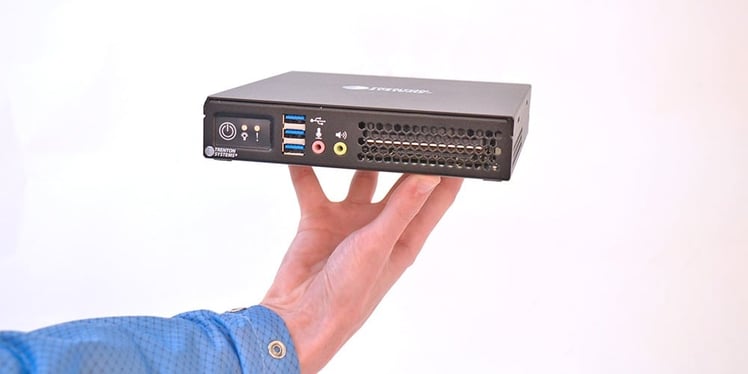
Photo: Rugged mini PCs can usually fit in the palm of your hand. This one's easily balanced on the model's fingertips.
What are some examples of a rugged mini PC?
Several rugged computer manufacturers have a rugged mini PC on the market.
The ION Rugged Mini PC, for example, boasts lightning-fast performance, affordability, durability, an incredibly long life, a customizable BIOS, revision control, an industry-leading 5-year warranty, and free limited lifetime support.
Where else can you get all those benefits in a small rugged computer?
Here’s an overview of the ION Rugged Mini PC's specifications:
| Trenton Systems ION Rugged Mini PC | |
| Dimensions | 6.8 (L) x 7 (W) x 1.4 (H) inches |
| CPU | 8th or 9th Gen Coffee Lake Intel Core i3, i5 or i7 processor |
| Storage | Internal M.2 NVME x4 PCie SSD, internal 2.5” SATA SSD |
| Input/Output | 6 USB 3.0 ports; 3 Gigabit Ethernet ports (10/100/1000 Mbps); 1 DisplayPort; 1 RS232 Serial Port; 1 VGA Port; audio input/output jacks |
| Manufactured | In the USA |
Other examples of rugged mini computers include the SuperServer E200-8D by SuperMicro. Here are the specifications:
| SuperServer E200-8D | |
| Dimensions | 5.59 (L) x 15 (W) x 10.87 (H) inches |
| CPU | Intel Xeon processor D-1528 |
| Storage | M.2 PCI-E 3.0 x4 (SATA support), M Key 2242/2280 |
| Input/Output | 6 SATA3 (6 Gbps) ports; 2 RJ45 Gigabit LAN ports; 2 RJ45 10GBase-T ports; 1 RJ45 Dedicated IPMI LAN port; 2 USB 3.0 ports; 1 VGA port |
Yet another example of a rugged mini PC is the OnLogic Industrial Intel Coffee Lake Mini-ITX Computer (MC510-50). Check out these specifications:
| OnLogic MC510-50 | |
| Dimensions | 7.6 (W) x 2.35 (H) x 7.86 (D) inches |
| CPU | Intel Celeron, Intel Pentium, 8th Gen Coffee Lake Intel Core i3, i5 and i7 |
| Storage | SATA M.2 SSD, support for 2.5" SATA3 drives |
| Input/Output | 2 DisplayPorts; 2 Gigabit LAN ports; 4 USB 3.0 ports; 2 audio jacks; 2 USB ports |
Photo: A rugged mini PC with its lid removed.
What are the advantages of a rugged mini PC?
There are four primary advantages of equipping your program or application with a rugged mini PC: affordability, durability, small form factor, and simplicity.
- Affordability: Most rugged mini PCs fall within the range of $1,000 to $3,000, depending on the configuration.
- Durability: Rugged mini PCs are built to withstand and function smoothly in high-temperature, low-temperature, high-shock, high-vibration, and high-humidity environments, among other harsh or climatically severe environments.
- Small form factor: The rugged mini PC's small form factor is perfect for desktop naval or aerospace applications and environments in which space is limited and weight must be monitored or controlled. They're lightweight, can fit into the palm of your hand, and are a lot quieter than many rugged computers. With fanless rugged mini PCs, a lot of times, you won’t even realize the computers are there.
- Simplicity: Rugged mini PCs are ideal computers for military, industrial, and commercial applications that require a small, simplistic rugged computing solution. Opportunity for expansion is limited, but this typically isn’t a concern for the average user of a rugged mini PC. If you don't have room for a full-sized rugged server or workstation but still want to make use of available space and need to add a system to your project, then a rugged mini PC may indeed be the right choice for you.
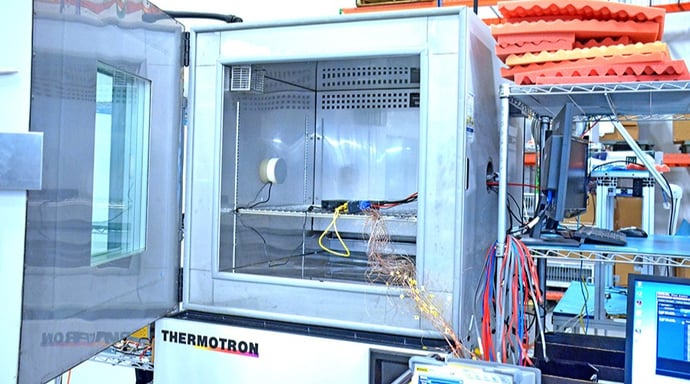
Photo: A rugged mini PC situated inside a Thermotron environmental testing chamber, where it will undergo rigorous stress testing to ensure durability and reliability in the field.
Is a rugged mini PC worth buying?
Rugged mini PCs make for the perfect military or industrial mini PC, but there are several factors to consider before purchasing the right rugged mini PC for your program or application.
The rugged mini PC’s small form factor usually isn't ideal for programs and applications that expect significant expansion down the line.
Given the computer's small-form-factor motherboard, most can’t physically support a ton of PCIe slots, which limits opportunities for GPU, storage, and network expansion.
Thankfully, rugged mini PCs are configurable to your needs upon purchase, and should you, for instance, desire more storage capacity, hard disk drives (HDDs) or solid-state drives (SSDs) are easily replaceable thanks to the rugged mini PC's size and simplicity. You could also consider external USB storage options.
Now, if you need something small and lightweight, but you still require the ability to expand later, check out our 1U rugged servers and PCIe expansion kits.
Photo: A rugged mini PC supported by a VESA mount.
Conclusion
If you need a military or industrial PC that's super-small, lightweight, durable, equipped with the latest-generation Intel Core processors, and decked out with plenty of RAM and ultra-fast NVME storage, consider a rugged mini PC, perfect for those demanding military, industrial, or commercial applications that require speed, durability, reliability, and impressive performance in a small but sturdy package.
Check out our other ION Rugged Mini PC blog post to learn more about how Trenton Systems is solving an industry-wide need with its first rugged mini PC.
Oh, and did we mention that Trenton Systems' rugged mini PCs are proudly made in the USA?
Trenton Systems would like to thank the following publications for featuring the rugged ION Mini PC:
Share this
- High-performance computers (42)
- Military computers (38)
- Rugged computers (32)
- Cybersecurity (25)
- Industrial computers (25)
- Military servers (24)
- MIL-SPEC (20)
- Rugged servers (19)
- Press Release (17)
- Industrial servers (16)
- MIL-STD-810 (16)
- 5G Technology (14)
- Intel (13)
- Rack mount servers (12)
- processing (12)
- Computer hardware (11)
- Edge computing (11)
- Rugged workstations (11)
- Made in USA (10)
- Partnerships (9)
- Rugged computing (9)
- Sales, Marketing, and Business Development (9)
- Trenton Systems (9)
- networking (9)
- Peripheral Component Interconnect Express (PCIe) (7)
- Encryption (6)
- Federal Information Processing Standards (FIPS) (6)
- GPUs (6)
- IPU (6)
- Joint All-Domain Command and Control (JADC2) (6)
- Server motherboards (6)
- artificial intelligence (6)
- Computer stress tests (5)
- Cross domain solutions (5)
- Mission-critical servers (5)
- Rugged mini PCs (5)
- AI (4)
- BIOS (4)
- CPU (4)
- Defense (4)
- Military primes (4)
- Mission-critical systems (4)
- Platform Firmware Resilience (PFR) (4)
- Rugged blade servers (4)
- containerization (4)
- data protection (4)
- virtualization (4)
- Counterfeit electronic parts (3)
- DO-160 (3)
- Edge servers (3)
- Firmware (3)
- HPC (3)
- Just a Bunch of Disks (JBOD) (3)
- Leadership (3)
- Navy (3)
- O-RAN (3)
- RAID (3)
- RAM (3)
- Revision control (3)
- Ruggedization (3)
- SATCOM (3)
- Storage servers (3)
- Supply chain (3)
- Tactical Advanced Computer (TAC) (3)
- Wide-temp computers (3)
- computers made in the USA (3)
- data transfer (3)
- deep learning (3)
- embedded computers (3)
- embedded systems (3)
- firmware security (3)
- machine learning (3)
- Automatic test equipment (ATE) (2)
- C6ISR (2)
- COTS (2)
- COVID-19 (2)
- CPUs (2)
- Compliance (2)
- Compute Express Link (CXL) (2)
- Computer networking (2)
- Controlled Unclassified Information (CUI) (2)
- DDR (2)
- DDR4 (2)
- DPU (2)
- Dual CPU motherboards (2)
- EW (2)
- I/O (2)
- Military standards (2)
- NVIDIA (2)
- NVMe SSDs (2)
- PCIe (2)
- PCIe 4.0 (2)
- PCIe 5.0 (2)
- RAN (2)
- SIGINT (2)
- SWaP-C (2)
- Software Guard Extensions (SGX) (2)
- Submarines (2)
- Supply chain security (2)
- TAA compliance (2)
- airborne (2)
- as9100d (2)
- chassis (2)
- data diode (2)
- end-to-end solution (2)
- hardware security (2)
- hardware virtualization (2)
- integrated combat system (2)
- manufacturing reps (2)
- memory (2)
- mission computers (2)
- private 5G (2)
- protection (2)
- secure by design (2)
- small form factor (2)
- software security (2)
- vRAN (2)
- zero trust (2)
- zero trust architecture (2)
- 3U BAM Server (1)
- 4G (1)
- 4U (1)
- 5G Frequencies (1)
- 5G Frequency Bands (1)
- AI/ML/DL (1)
- Access CDS (1)
- Aegis Combat System (1)
- Armed Forces (1)
- Asymmetric encryption (1)
- C-RAN (1)
- COMINT (1)
- Cloud-based CDS (1)
- Coast Guard (1)
- Compliance testing (1)
- Computer life cycle (1)
- Containers (1)
- D-RAN (1)
- DART (1)
- DDR5 (1)
- DMEA (1)
- Data Center Modular Hardware System (DC-MHS) (1)
- Data Plane Development Kit (DPDK) (1)
- Defense Advanced Research Projects (DARP) (1)
- ELINT (1)
- EMI (1)
- EO/IR (1)
- Electromagnetic Interference (1)
- Electronic Warfare (EW) (1)
- FIPS 140-2 (1)
- FIPS 140-3 (1)
- Field Programmable Gate Array (FPGA) (1)
- Ground Control Stations (GCS) (1)
- Hardware-based CDS (1)
- Hybrid CDS (1)
- IES.5G (1)
- ION Mini PC (1)
- IP Ratings (1)
- IPMI (1)
- Industrial Internet of Things (IIoT) (1)
- Industry news (1)
- Integrated Base Defense (IBD) (1)
- LAN ports (1)
- LTE (1)
- Life cycle management (1)
- Lockheed Martin (1)
- MIL-S-901 (1)
- MIL-STD-167-1 (1)
- MIL-STD-461 (1)
- MIL-STD-464 (1)
- MOSA (1)
- Multi-Access Edge Computing (1)
- NASA (1)
- NIC (1)
- NIC Card (1)
- NVMe (1)
- O-RAN compliant (1)
- Oil and Gas (1)
- Open Compute Project (OCP) (1)
- OpenRAN (1)
- P4 (1)
- PCIe card (1)
- PCIe lane (1)
- PCIe slot (1)
- Precision timestamping (1)
- Product life cycle (1)
- ROM (1)
- Raytheon (1)
- Remotely piloted aircraft (RPA) (1)
- Rugged computing glossary (1)
- SEDs (1)
- SIM Card (1)
- Secure boot (1)
- Sensor Open Systems Architecture (SOSA) (1)
- Small form-factor pluggable (SFP) (1)
- Smart Edge (1)
- Smart NIC (1)
- SmartNIC (1)
- Software-based CDS (1)
- Symmetric encryption (1)
- System hardening (1)
- System hardening best practices (1)
- TME (1)
- Tech Partners (1)
- Total Memory Encryption (TME) (1)
- Transfer CDS (1)
- USB ports (1)
- VMEbus International Trade Association (VITA) (1)
- Vertical Lift Consortium (VLC) (1)
- Virtual machines (1)
- What are embedded systems? (1)
- Wired access backhaul (1)
- Wireless access backhaul (1)
- accredidation (1)
- aerospace (1)
- air gaps (1)
- airborne computers (1)
- asteroid (1)
- authentication (1)
- autonomous (1)
- certification (1)
- cognitive software-defined radios (CDRS) (1)
- command and control (C2) (1)
- communications (1)
- cores (1)
- custom (1)
- customer service (1)
- customer support (1)
- data linking (1)
- data recording (1)
- ethernet (1)
- full disk encryption (1)
- hardware monitoring (1)
- heat sink (1)
- hypervisor (1)
- in-house technical support (1)
- input (1)
- integrated edge solution (1)
- international business (1)
- licensed spectrum (1)
- liquid cooling (1)
- mCOTS (1)
- microelectronics (1)
- missile defense (1)
- mixed criticality (1)
- moving (1)
- multi-factor authentication (1)
- network slicing (1)
- neural networks (1)
- new headquarters (1)
- next generation interceptor (1)
- non-volatile memory (1)
- operating system (1)
- output (1)
- outsourced technical support (1)
- post-boot (1)
- pre-boot (1)
- private networks (1)
- public networks (1)
- radio access network (RAN) (1)
- reconnaissance (1)
- rugged memory (1)
- secure flash (1)
- security (1)
- self-encrypting drives (SEDs) (1)
- sff (1)
- software (1)
- software-defined radios (SDRs) (1)
- speeds and feeds (1)
- standalone (1)
- storage (1)
- systems (1)
- tactical wide area networks (1)
- technical support (1)
- technology (1)
- third-party motherboards (1)
- troposcatter communication (1)
- unlicensed spectrum (1)
- volatile memory (1)
- vpx (1)
- zero trust network (1)
- January 2025 (1)
- November 2024 (1)
- October 2024 (1)
- August 2024 (1)
- July 2024 (1)
- May 2024 (1)
- April 2024 (3)
- February 2024 (1)
- November 2023 (1)
- October 2023 (1)
- July 2023 (1)
- June 2023 (3)
- May 2023 (7)
- April 2023 (5)
- March 2023 (7)
- December 2022 (2)
- November 2022 (6)
- October 2022 (7)
- September 2022 (8)
- August 2022 (3)
- July 2022 (4)
- June 2022 (13)
- May 2022 (10)
- April 2022 (4)
- March 2022 (11)
- February 2022 (4)
- January 2022 (4)
- December 2021 (1)
- November 2021 (4)
- September 2021 (2)
- August 2021 (1)
- July 2021 (2)
- June 2021 (3)
- May 2021 (4)
- April 2021 (3)
- March 2021 (3)
- February 2021 (8)
- January 2021 (4)
- December 2020 (5)
- November 2020 (5)
- October 2020 (4)
- September 2020 (4)
- August 2020 (6)
- July 2020 (9)
- June 2020 (11)
- May 2020 (13)
- April 2020 (8)
- February 2020 (1)
- January 2020 (1)
- October 2019 (1)
- August 2019 (2)
- July 2019 (2)
- March 2019 (1)
- January 2019 (2)
- December 2018 (1)
- November 2018 (2)
- October 2018 (5)
- September 2018 (3)
- July 2018 (1)
- April 2018 (2)
- March 2018 (1)
- February 2018 (9)
- January 2018 (27)
- December 2017 (1)
- November 2017 (2)
- October 2017 (3)
/Trenton%20Systems%20Circular%20Logo-3.png?width=50&height=50&name=Trenton%20Systems%20Circular%20Logo-3.png)



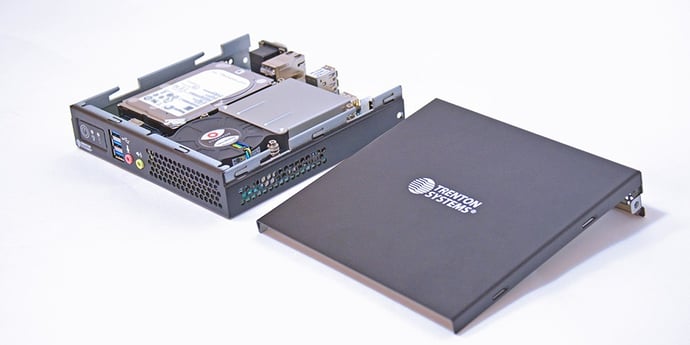
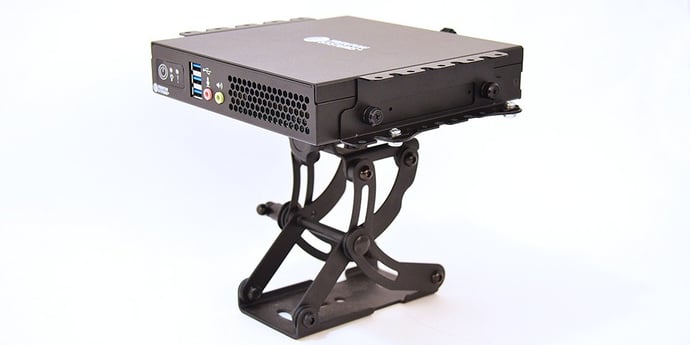

Comments (2)